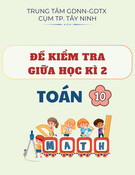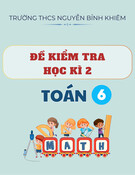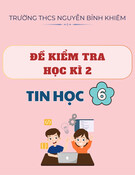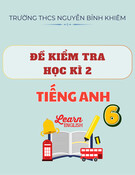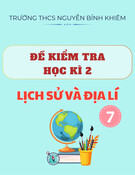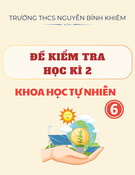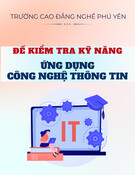
BỘ 6 ĐỀ THI CHUYÊN ANH
VÀO LỚP 10
NĂM 2020 - CÓ ĐÁP ÁN

1. Đề tuyển sinh vào lớp 10 THPT chuyên môn Tiếng Anh năm 2020-2021 có đáp án -
Sở GD&ĐT Phú Yên
2. Đề tuyển sinh vào lớp 10 THPT chuyên môn Tiếng Anh năm 2020-2021 có đáp án -
Sở GD&ĐT Quảng Trị
3. Đề tuyển sinh vào lớp 10 THPT chuyên môn Tiếng Anh năm 2020-2021 có đáp án -
Sở GD&ĐT Vĩnh Phúc
4. Đề tuyển sinh vào lớp 10 THPT chuyên môn Tiếng Anh năm 2020-2021 có đáp án -
Trường Đại học KHXH&NV
5. Đề tuyển sinh vào lớp 10 THPT chuyên môn Tiếng Anh năm 2020-2021 có đáp án -
Trường Đại học Sư phạm Hà Nội
6. Đề tuyển sinh vào lớp 10 THPT chuyên môn Tiếng Anh năm 2020-2021 có đáp án -
Trường THPT chuyên Long An

Trang 1/6
SỞ GIÁO DỤC VÀ ĐÀO TẠO
LONG AN
(Đề thi gồm 06 trang)
KỲ THI TUYỂN SINH LỚP 10 NĂM HỌC 2020–2021
Môn thi: TIẾNG ANH (Chuyên)
Thời gian làm bài: 120 phút (không kể thời gian phát đề)
Ngày thi: 17/7/2020
Thí sinh làm bài trên PHIẾU TRẢ LỜI
----------------------------------------------------------------------------------------------------------------
I. LISTENING (2.0 points)
PART 1. You will hear people talking in five different situations. Listen to each situation
TWICE. For questions 1 – 5, choose the best answer A, B or C. (1.0 point)
1. You hear two people talking about a party.
Where are they?
A. in a taxi
B. on a bus
C. in a car
2. You hear a woman buying a ticket.
How many different forms of transport will she need to use for her journey?
A. two
B. three
C. four
3. You hear a man and a woman talking.
What are they looking at?
A. a ferry
B. a big ship
C. the sea
4. You hear a man at an airport.
What is he doing?
A. going through customs
B. checking in
C. going through passport control
5. You hear a woman talking to a mechanic.
What’s the problem with her motorbike?
A. a damaged wheel and a flat tyre
B. a flat tyre and a broken mirror
C. a broken mirror and a damaged wheel
PART 2. You will hear a girl called Laura Beamer talking about being a volunteer at a
summer school for 7-14 year olds, which is called the Children's University. For questions
1-5, complete the sentences with a word or short phrase. (1.0 point)
VOLUNTEER AT CHILDREN’S UNIVERSITY
The Children's University was started (1) _________ years ago.
This year the topic and overall theme was (2)____________ .
Laura's group gave some workshops about how (3) ____________ is made.
At the end of the Children's University there was a (4) _____________ ceremony.
Children who attended the most workshops received a gold (5)____________ each.
ĐỀ CHÍNH THỨC

Trang 2/6
II. READING (2.0 points)
PART 1. Read the following passage and mark the letter A, B, C, or D to indicate the
correct answer to each of the questions from 1 to 5. (1.0 point)
Most journeys in Britain and the US are made by road. Some of these are made on public
transport but most are by private car.
In Britain many people rely on their cars for daily local activities, e.g. getting to work, doing
the shopping, and visiting friends. People living in urban areas may use buses, trains or, in
London, the Underground, to get to city centers, mainly because traffic is often heavy and it
is difficult to find anywhere to park a car. Some places in the country may have a bus only
two or three times a week so people living there have no choice but to rely on their cars.
In the US large cities have good public transportation systems. The El railroad in Chicago
and the underground systems of New York, Boston, San Francisco and Washington DC are
heavily used. Elsewhere, most Americans prefer to use their cars. Families often have
two cars and, outside major cities, have to drive fairly long distances to schools, offices,
shops, banks, etc. Many college and even high-school students have their own cars.
Long-distance travel in Britain is also mainly by road, though railways link most towns and
cities. Most places are linked by motorways or other fast roads and many people prefer to
drive at their own convenience rather than use a train, even though they may get stuck in a
traffic jam. Long- distance coach/bus services are usually a cheaper alternative to trains, but
they take longer and may be less comfortable. Some long-distance travel, especially that
undertaken for business reasons, may be by air. There are regular flights between regional
airports, as well as to and from London. A lot of freight is also distributed by road, though
heavier items and raw materials often go by rail.
In the US much long-distance travel is by air. America has two main long-distance bus
companies, Greyhound and Trailways. Amtrak, the national network, provides rail services
for passengers. Private railway companies such as Union Pacific now carry only freight,
though in fact over 70% of freight goes by road.
The main problems associated with road transport in both Britain and the US are traffic
congestion and pollution. It is predicted that the number of cars on British roads will increase
by a third within a few years, making both these problems worse. The British government
would like more people to use public transport, but so far they have had little success in
persuading people to give up their cars or to share rides with neighbours. Most people say
that public transport is simply not good enough. Americans too have resisted government
requests to share cars because it is less convenient and restricts their freedom. Petrol/gasoline
is relatively cheap in the US and outside the major cities public transport is bad, so they
see no reason to use their cars less.
(Extracted from Oxford Guide to British and American Culture, Oxford University Press, 2000)
1. In Britain and the US most people travel by .
A. sea B. rail C. road D. air
2. According to the passage, people in London may prefer the Underground to their own
cars due to .
A. cheap tickets B. air pollution C. long distances D. heavy traffic
3. Which of the following is NOT true according to the passage?
A. Few college students in the US have their own cars.
B. Families in the US often have more than one car.
C. Most Americans prefer to drive their cars outside large cities.
D. The underground systems are popular in some major US cities.

Trang 3/6
4. The phrase “at their own convenience” in paragraph 4 is closest in meaning to
A. at the latest time and nearest place
B. at an appropriate time and place
C. at an early time and nearby place
D. at the fastest time and nearest place
5. According to the passage, people in Britain refuse public transport because .
A. they like to share rides with neighbours
B. they think it is not good enough
C. they see no reason to use their cars less
D. petrol is relatively cheap in Britain
PART 2. You are going to read an article in which the writer looks at the harm done by
plastic bags and ways of reducing this. Five sentences have been removed from the article.
Choose from the sentences A-F the one which fits each gap (1-5). There is one extra
sentence which you do not need to use. (1.0 point)
GETTING RID OF PLASTIC BAGS
By Michael McCarthy
Plastic bags are one of the greatest problems of the consumer society - or to be more precise,
of the throwaway society.
According to a recent study, whereas plastic bags were rarely seen at sea in the late eighties
and early nineties, they are now being found almost everywhere across the planet. They are
among the 12 items of rubbish most often found in coastal clean-ups. (1)_____ Windblown
plastic bags are so common in Africa that a small industry has appeared: collecting bags and
using them to make hats and other items.
What matters is what happens to them after use. Enormous numbers end up being buried or
burnt, which is an enormous waste of the oil products which have gone into their
manufacture. (2) _____ Turtles mistake them for their jellyfish food and choke on them; birds
mistake them for fish with similar consequences; dolphins have been found with plastic bags
preventing them breathing properly.
The wildlife film-maker Rebecca Hosking was shocked by the effects of the bags on birds on
the Pacific island of Midway. She started a movement to turn her hometown into the first
community in the country to be free of plastic bags. Many local residents and shopkeepers
joined in, and the idea of getting rid of them completely soon spread to other towns and
villages.
Although some people remain unconvinced, it does seem possible that the entire country
could eventually become plastic-bag free. Who could have imagined half-a-century ago that
our public places would one day all become cigarette-smoke free? Or that we would all be
using lead-free petrol? Who would have thought even a decade ago, come to that, that about
two-thirds of us would by now be actively involved in recycling? (3)_______
What is needed is a general change in consumer attitudes, towards the habit of using re-usable
shopping bags. Older people will remember how this used to be entirely normal as every
household had a 'shopping bag', a strong bag which was used to carry items bought in the
daily trip to the shops. (4) _____Today, many of us tend to drive to the supermarket once a
week and fill up the car with seven days' worth of supplies, for which plastic bags, of course,
are fantastically useful. It's a hard habit to break.










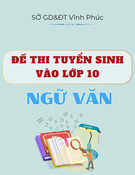
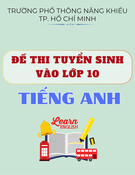
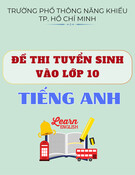







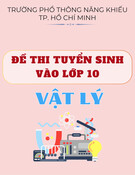

![Đề thi Tiếng Anh có đáp án [kèm lời giải chi tiết]](https://cdn.tailieu.vn/images/document/thumbnail/2025/20250810/duykpmg/135x160/64731754886819.jpg)
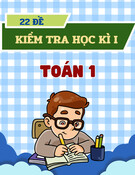
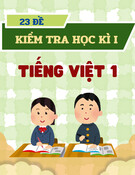


![Đề thi học kì 2 Vật lý lớp 11: Đề minh họa [Mới nhất]](https://cdn.tailieu.vn/images/document/thumbnail/2025/20250709/linhnhil/135x160/711752026408.jpg)
